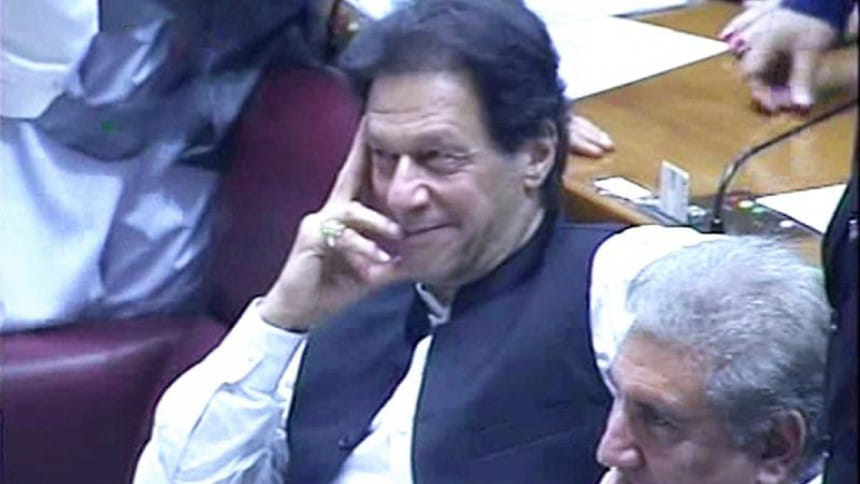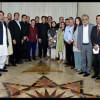Imran Khan sworn in as Pakistan PM

Pakistan's new Prime Minister Imran Khan was sworn in at a ceremony in Islamabad yesterday, ushering in a new political era as the World Cup cricket hero officially took the reins of power in the nuclear-armed country.
The ceremony at the President's House in the capital marks the end of decades of rotating leadership between the ousted Pakistan Muslim League-Nawaz (PML-N) and the Pakistan Peoples Party (PPP), punctuated by periods of army rule.
A tearful Khan smiled as he stumbled over some of the words of the oath administered to him by President Mamnoon Hussain during the ceremony, televised live by the state broadcaster PTV.
He swore to "discharge my duties and perform my functions honestly, to the best of my ability... and always in the interest of the sovereignty, integrity, solidarity, well-being and prosperity of Pakistan".
The 65-year-old former cricketer, who captained Pakistan to World Cup victory in 1992, had won a confidence vote in the National Assembly the previous day.
Also read: Pak MPs elect Imran as new PM
In parliament on Friday he came out fighting with a divisive speech in which he vowed to hold corrupt officials accountable.
The July 25 election that brought his Pakistan Tehreek-e-Insaf party to power was branded "Pakistan's dirtiest", with accusations throughout the campaign that the military was trying to tilt the playing field in Khan's favour.
The army and Khan have denied claims from rival parties of "blatant" vote rigging.
Khan's third wife Bushra Bibi kept her eyes cast modestly downwards during yesterday's ceremony.
It was her first public appearance since their wedding earlier this year, and she appeared escorted by tight security and covered from head to toe in a white niqab, a conservative garment by Pakistani standards.
Khan had invited the rest of the 1992 cricket team to the ceremony, and fast bowler Wasim Akram was pictured smiling among the crowd.
Another cricketer-turned-politician, India's Navjot Singh Sidhu, was seated in the front row and earlier warmly embraced the powerful Pakistan army chief General Qamar Javed Bajwa.
Later, Khan went to the Prime Minister's house in the capital, where he was met by a guard of honour.
Khan campaigned on promises to end widespread graft while building an "Islamic welfare state".
"I promise to my God that everyone who looted this country will be made accountable," he said in Friday's speech to parliament.
He also defended himself against widespread claims the military had targeted the formerly ruling PML-N, especially its leader Nawaz Sharif, and fixed the playing field in Khan's favour.
"No dictator has taken care of me. I am standing here in this parliament on my own feet," he told the raucous assembly as opposition members shouted protest slogans.
Pakistan's 71-year history has been punctuated by coups and assassinations and the 2018 election was only its second ever democratic transition of power from one civilian government to another.
No prime minister of Pakistan has ever completed a full five-year term. Khan will have to contend with the same issue as many predecessors: how to maintain a power balance in civil-military relations.
The new 15-member cabinet was announced by PTI in a tweet.
Shah Mahmood Qureshi, who previously served as foreign minister under a PPP government until 2011 when he switched to PTI, returns to the role.
Pervez Khattak, the former chief minister of Khan's stronghold in Khyber Pakhtoonkhwa, was appointed defence minister.
Khan and his cabinet face a myriad of challenges including militant extremism, water shortages, and a rapidly growing population negating growth in the developing country, among others.
A massive power outage that plunged over 60 percent of the port city of Karachi and southwestern Balochistan province Friday evening starkly highlighted a chronic energy crisis the country faces.
Most pressing is a looming economic crisis, with speculation that Pakistan will have to seek a bailout from the International Monetary Fund.
PTI fell short of an outright majority in the July 25 vote, forcing Khan to partner with smaller parties and independents in order to form a government.
But it retained its stronghold in northwestern Khyber Pakhtunkhwa province and has made an alliance with regional parties in Balochistan.
The party is also expected to form a coalition government in powerful Punjab, formerly a PML-N stronghold. Southern Sindh province remains in the hands of the PPP.
PTI secured the positions of Speaker and Deputy Speaker in the National Assembly -- putting Khan in a strong position to act on his legislative agenda.
In the West, Khan is often seen as a celebrity whose high-profile romances were tabloid fodder. But at home he cuts a more conservative persona as a devout Muslim who believes feminism has degraded motherhood.
Known in Pakistan as "Taliban Khan" for his calls to hold talks with insurgents, he increasingly catered to religious hardliners during the campaign, spurring fears his leadership could embolden extremists.

 For all latest news, follow The Daily Star's Google News channel.
For all latest news, follow The Daily Star's Google News channel. 





Comments